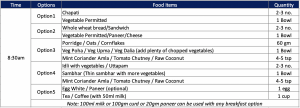Diet Chart For Breastfeeding Mothers: Perfect Meal Plan For Indian Mothers
A Healthy Mother raises a healthy baby. Whether you are a new mom or a soon to be mom, this article demystifies your nutritional needs. Learning about the do’s and don’ts of this phase will help you structure a system, that aids your recovery. While it is common to overlook a mother’s diet in the hullabaloo of getting adjusted to parenting, it is an error that triggers severe health problems in the long run. With the sample charts in this article, it will be easier to understand and simplify your day to day meals.

To accommodate the growing life, a mother’s body goes through a complete transformation. While pregnancy is gradual in its progress, delivery is a shock. Severe blood loss, water retention, the physical and mental stress of a child birth, drains her body. Nutrition is a must for healing. Lack of it would in turn invite diseases that affect for life- joint pains, anaemia, gastroenteritis being the most common ones. But it’s not just restricted to the mother, lack of nutrition in mother will affect the well-being of the baby as well. Breast milk is the elixir of life for a baby. The quality of breast milk depends on the quality of the mother’s nutrition. Also without adequate food to fuel the body, it is impossible for a mother to have the energy needed to efficiently take care of her baby. Hence, at least for the first three months, prioritising both mother and baby is of utmost importance.
I am a mother. The struggles of being on the job of raising a happy and healthy baby have marked my journey as well. Pressed for time while feeding, burping, cleaning, soothing a new born, I too would wonder how to best balance my health. Out of my first-hand experience, advice from doctors, guidance from elders and research, did I find my path. I share it with you a list of do’s, do not’s and a sample diet chart, to make this phase easier.
What are the Do’s?
1. Eat every 2 hrs
Timed meals are a must. Of course it’s difficult to sync it with the clock and the baby’s ever changing needs. But as a thumb rule, stick to feeding yourself every two hours. Most new mothers tend to have a huge gap between their meals. This starts a chain of improper digestion leading to gastrointestinal issues. Bloating, gas, acidity can quickly escalate to being severe problems. In turn, the breast milk supply and quality drops. The baby too can develop frequent gas problems if the mother is suffering from it. To avoid this and make your breast milk nutrient dense, make your meals a priority. If you find it hard to dedicate time, you may choose to eat while you are breast feeding the baby. Multitasking is your forte.
2. Hydrate
Breast milk is 80% water. The nutrients that your baby needs are packed in the breast milk. Dehydration will immediately decrease your milk supply. 8-10 glasses of water is a minimum. Fill bottles of water and keep it handy. Sipping water whenever you see the bottle, is an easy way to hydrate. My thumb rule was to consume a glass of water after every feeding session with my baby.
3. Consume milk and milk products
Calcium deficiency is one of the main affliction that occurs. The easiest way to safeguard oneself is by ensuring consumption of 3-4 glasses of milk or milk products like curd, buttermilk or cheese. Curd and buttermilk are wonderful for your gut health as well.
4. Vitamin-C
For effective absorption of iron in your body, Vit-C is a must. Amla, oranges, guava, kiwi are just a few options to boost up the Vit-C. Vit-c is a primary immunity booster. Regular consumption of Vit-C rich foods in your diet will help in your healing as well.
5. Legumes (Dal), Vegetables and Fruits
2-3 bowls of dal, 2-3 bowls of green vegetables and 3-4 bowls of fruits will bring in a healthy dose of vitamins, minerals and fibre in your diet. Dal also adds proteins to your diet. To make it easily digestible, overnight soaking of dal before cooking is recommended.
What are the Don’ts
1. Smoking and Alcohol consumption
Reiterating the much proclaimed message- smoking is injurious to health. It is an absolute NO, during and while breast feeding. Should anyone in your family smoke, ensure that neither you or your child is subjected to passive smoking. Alcohol and its consumption will affect your breast milk, in turn causing developmental issues in your child. Not to mention that alcohol retards your ability to take decisions. Both smoking and alcohol, are detrimental to recovery of your body.
2. Do not self-medicate
All that you consume, is carried to your baby via the breast milk. Unless advised by your medical practitioner, stick to home remedies to cure any minor health issues.
3. Spicy Food
Too much of chilli or spices in your meal can irritate and upset your stomach. Not only can this be passed to you child, causing gas and acidity, it can affect the healing of your stitches (be it c section or a natural birth).
4. Pungent or Strong food flavours
Garlic, onion and other strong food flavours can be consumed in moderation. However, going overboard with them causes odour sensitivity in a new born. The new born identifies the smell of you. Eating garlic and onion in excess affects it, irritating your baby.
5. Foods that cause gas and bloating
Most of us are aware if we are sensitive to any food group. For example, some people have a gassy reaction to rajma. It’s best to avoid any food that causes such a reaction in your system. Not only can it cause pressure on your stitches, the gassy reaction can be passed on to your new born.
The Sample Diet Chart
While keeping the above points in mind, I have shared a basic diet chart with you. Adjusting it to suit your time frame and culinary preferences with different combinations, this intends to cover all essential food groups. As long as you have a good serving of each, while keeping to the easily digestible form of it, you will have a foundation in nutrition for both you and your baby.
Early Morning
Start everyday with two glasses of water, the moment you wake up. Follow it with suggestions from the chart below. The focus being on waking up your system, while absorbing essential nutrients the first thing in the morning. You can also fortify your mommy diet with age old wisdom of the elders by consuming foods like Panjiri or Gond laddus.

Breakfast
Breakfast is usually advised to be King Size. Sparkle you day with a breakfast fit for a queen. Both quantity and quality need attention. Carbohydrates will give you the energy to last the day. Proteins will accelerate the healing process and will boost up your breast milk. You can either stick to plant proteins or add animal proteins like eggs. A healthy addition of vitamins , minerals, fibre can be planned by referencing and working out a combination that suits you. Indian kitchens have a variety of chutneys to add a happy and healthy flavour. Explore them and enjoy with all meals.

Mid-morning snack
Hydrate yourself with liquids like chaanch, fresh juice, nimbu paani, dal soup and likes. Should you desire something solid, salads are a wonderful option.

Lunch
It’s a meal. And the quantity has to be in accordance to it. Load up on your carbohydrates with chappati, rice, idlis and likes. Add an easily digestible dal preparation. Leafy vegetables, salads, subzi preparations, add variety to your diet. A milk product like paneer or a non-vegetarian dish, gives a boost of protein. Dahi, raita, increases the calcium consumption, while making it easier of you to digest the entire feast.

Early evening snack
With some luck you might have had a little nap. Time to recharge. Tea with dhokla, idli, Gond laddu starts your evening.

Late evening snack
Soups are ideal at this hour. Packed with nutrition and hydrating at the same time. Avoid fruit juices in the evening.

Dinner
Dinner is lighter than lunch to essentially aid digestion. You might choose to reduce the quantity of each serving. However, it is necessary to cover all the food groups in this meal as well. Should you want a little dessert, feel free to have a small serving. Fruits are not recommended as an alternative for dessert in dinner.

Milk
A glass of lukewarm milk before you turn in for the night, will aid a restful sleep. A tiny pinch of nutmeg and cinnamon in it, is flavourful and calming.
![]()
Though this list concludes, it is by no means the only way to go. Your environment and climate could require you to add or deduct from this list. Both tea and coffee can be consumed in moderation. This is not the time to embark on a weight loss diet. Breast feeding itself burns more calories than working out on a treadmill. Your and your baby’s health come first.
As always, please do feel free to add your comments, feedbacks, queries and any hearty parenting conversation, through any of my social media platforms. You can reach out to me via Facebook, YouTube, twitter, Instagram and this website. This content is also available in a video format (link). Share it with as many parents as you can. We benefit from learning another’s experiences. Stay well. Enjoy simplified parenting.
♥♥इस आर्टिकल में एक नयी मदर के लिए डाइट चार्ट दी गयी है | इस आर्टिकल की जानकारी हिंदी में पाने के लिए नीचे दिए वीडियो को देखें ►








 Share
Share












COMMENTS